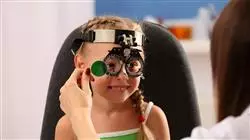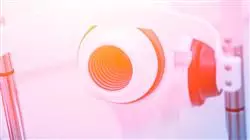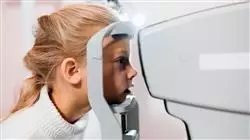University certificate
The world's largest faculty of medicine”
Why study at TECH?
Work with children and adolescents with visual pathologies and become a factor of change towards a better quality of life in your patients by studying this TECH Postgraduate diploma"

Pediatric Neuro-Ophthalmology is responsible for studying the visual structural functions and their involvement with the brain of patients at an early age. In other words, it analyzes the ocular mobility, that of the cranial nerves and that of the structures that coordinate the eye movements, regularizing the integration with other sensory systems.
This Postgraduate diploma will seek to delve into Pediatric Neuro-Ophthalmology by studying, mainly, the main pathologies that can occur in minors. Likewise, it will delve into its diagnostic approach and treatment.
On the other hand, the contents of this Postgraduate diploma have been elaborated by ophthalmologists, neurologists and neurosurgeons, with the aim of enriching to the maximum the experience of the student. In this way, the professional will acquire diagnostic and therapeutic skills of the various Neuro-Ophthalmological pathologies known. In this way, you will be able to make a correct diagnostic approach for children by knowing the proper use of the most innovative technologies.
Finally, during the Postgraduate diploma will delve into the primary alterations of ocular motility (strabismus). All this with the aim of offering professionals the necessary knowledge about the primary alterations of eye motility and their therapeutic options in children and adolescents.
This knowledge can be acquired online, that is, without having to travel to any physical center to receive classes. Thus, you can continue with your academic process without giving up the rest of your daily activities.
If you want to acquire deep knowledge in the different pathologies that compromise eye motility, then this Postgraduate diploma is for you"
This Postgraduate diploma in Pediatric Neuro-Ophthalmology contains the most complete and up-to-date educational program on the market. The most important features of the program include:
- Practical cases presented by experts in medicine
- The graphic, schematic, and practical contents with which they are created, provide scientific and practical information on the disciplines that are essential for professional practice
- Practical exercises where the self-assessment process can be carried out to improve learning
- Its special emphasis on innovative methodologies
- Theoretical lessons, questions to the expert, debate forums on controversial topics, and individual reflection assignments
- Content that is accessible from any fixed or portable device with an Internet connection
This updating program is designed for the student to learn to perform a superior therapeutic approach to their patients with Neuro-Ophthalmological pathologies"
The program’s teaching staff includes professionals from the sector who contribute their work experience to this training program, as well as renowned specialists from leading societies and prestigious universities.
The multimedia content, developed with the latest educational technology, will provide the professional with situated and contextual learning, i.e., a simulated environment that will provide immersive training programmed to train in real situations.
This program is designed around Problem-Based Learning, whereby the professional must try to solve the different professional practice situations that arise during the academic year. For this purpose, the student will be assisted by an innovative interactive video system created by renowned and experienced experts.
Increase your skills in this field by studying at TECH and start to see how your job opportunities multiply"

Study comfortably at TECH based on the most reputable teaching methodology of the online academic landscape"
Syllabus
The contents of this program are divided into three modules that bring together intensive and eminently practical training on Neuro-Ophthalmological disorders and pathologies in pediatric patients. All this, in multimedia format, with videos, theoretical lessons and working tools of the highest level to facilitate the learning process of the doctors and help them to reach the highest level in their profession.

Quality content designed from the best teaching methodology will help you reach the highest in your work"
Module 1 Embryology, Anatomy and Physiology
1.1. Embryology of the Visual System
1.1.1. Columnar Model of the Embryology of the Visual System and CNS
1.1.2. Prosomeric Model of the Embryology of the Visual System and CNS
1.1.3. Ocular Teratology
1.2. Bone Anatomy: The Skull
1.3. Vascular Anatomy
1.4. Muscular Anatomy
1.5. Afferent Visual Pathway
1.5.1. Prechiasmatic Optic Pathways
1.5.2. Postchiasmatic Optic Pathways
1.6. Efferent Pathway
1.6.1. Anatomy of the Cranial Nerve Pairs
1.6.2. Brainstem Motor Nuclei
1.7. Sensory Innervation
1.8. Motor Innervation
1.9. Ocular Autonomic Nervous System
1.9.1. Sympathetic System
1.9.2. Parasympathetic System
1.10. Topographic Diagnosis of Visual Field Disturbances
Module 2. Strabismus
2.1. Applied Anatomy of the Extraocular Musculature
2.2. Development of the Visual System
2.3. Exploration
2.3.1. Assessment of Fusion, Suppression and Diplopia
2.3.2. Parks Test. Lancaster Screen
2.3.3. Differential Diagnosis between Strabismus and Neurological Disorder
2.4. Amblyopia
2.4.1. Strabismic Amblyopia
2.4.2. Amblyopia due to Anisometropia
2.4.3. Amblyopia due to Media Opacity
2.5. Esotropia
2.5.1. Acute Esotropia
2.5.2. Age-Related Esotropia
2.6. Exotropia
2.6.1. Acute Exotropia
2.7. Vertical Strabismus
2.7.1. Differential Diagnosis
2.7.2. Sagging Eye
2.8. Combined and Restrictive Syndromes
2.8.1. Duane Syndrome. Brown Syndrome
2.8.2. Myopic Myopathy
2.8.3. Thyroid Orbitopathy
2.8.4. Iatrogenic Myopathy
2.9. Refractive and Orthoptic Treatment
2.9.1. Optical Correction
2.9.2. Correction with Prisms
2.10. Surgical Management
2.10.1. Botulinum toxin
2.10.2. Extraocular Muscles Surgery
Module 3. Pediatric Neuro-Ophthalmology
3.1. Neuro-Ophthalmologic Examination in Children
3.1.1. Examination Techniques in the Pediatric Patient
3.1.2. Electrophysiology
3.2. The child With Low Vision. Delayed Visual Maturation
3.3. Cerebral Visual Impairment
3.4. Congenital Anomalies of the Anterior Optic Pathway
3.4.1. Hypoplasia
3.4.2. Colobomas and Optic Pits
3.4.3. Optic Nerve Drusen
3.5. Papillary Effacement
3.5.1. Intracranial Hypertension (IH) in Children
3.6. Optic Neuropathies in Childhood I
3.6.1. Inflammatory
3.6.2. Pathology
3.7. Optic Neuropathies in Childhood II Hereditary
3.7.1. Dominant Optic Atrophy
3.7.2. Leber Optic Neuropathy
3.8. Optical Atrophy and Papillary Excavation in the Child
3.9. Pediatric Tumor Pathology
3.9.1. Primary Tumors of the Optic Nerve
3.9.2. Midline Tumors
3.9.3. Posterior Fossa Tumors
3.10. Oculomotor Apraxia

Study at TECH and become part of this institution’s long list of success stories"
Postgraduate Diploma in Pediatric Neuro-ophthalmology.
If you are a healthcare professional with a passion for children's vision care and looking to expand your knowledge in pediatric neuro-ophthalmology, our Postgraduate Diploma in Pediatric Neuro-ophthalmology at TECH Global University is the perfect program for you. We are pleased to offer you a unique opportunity to specialize in the field of pediatric neuro-ophthalmology through our 6-month online class program. Supported by Postgraduate Diplomas in the Field, you'll have access to comprehensive, up-to-date learning that will enable you to effectively understand and address neuro-ophthalmologic conditions in children. Our online classes will allow you to study from the comfort of your home or anywhere you choose, giving you flexibility and adapting to your busy schedules. Through a combination of interactive lectures, case studies and practical activities, you will be able to apply your theoretical knowledge in real clinical situations.
Expand your Knowledge in a Highly Specialized Field with TECH.
During the program, you will explore fundamental topics related to pediatric neuro-ophthalmology, such as optic nerve disorders, strabismus, oculomotor nerve palsy, and neurological diseases that affect vision. You will learn about the most advanced diagnostic and evaluation methods, as well as the most effective treatment options to provide comprehensive care for pediatric patients. Upon completion of the programme, you will receive an internationally recognized Pediatric Neuro-ophthalmology Graduate Degree, validating your experience and skills in this specialized field. This degree will open up new career opportunities for you and will set you apart as a highly-skilled professional in children's eye care. Enroll in our Postgraduate Diploma today and expand your knowledge with TECH Global University!







